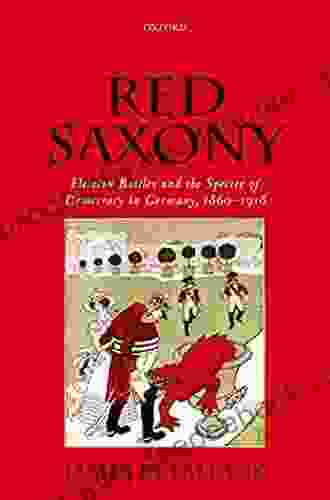The Battle for Democratic Ideals: Elections and the Shadow of Authoritarianism in Germany, 1860-1918

The period from 1860 to 1918 marked a tumultuous chapter in German history, characterized by a series of intense election battles that tested the boundaries of democracy. Against a backdrop of rapid industrialization, social unrest, and the rise of nationalism, the struggle for political representation and the preservation of democratic principles played out on a grand scale. This article delves into the complexities of these electoral contests, examining the competing ideologies, the strategies deployed by political parties, and the profound impact they had on the course of German history.
The Electoral Landscape: A Tale of Two Systems
The German electoral system during this period was a complex tapestry of direct and indirect voting methods. In the North German Confederation, established in 1867, universal male suffrage prevailed, allowing all adult males over 25 to directly elect members of the Reichstag (parliament). However, in the southern states of Bavaria, Württemberg, and Baden, a three-class electoral system persisted, where voters were divided into three classes based on their income and property. The wealthiest citizens, representing a tiny fraction of the population, held the most electoral power, while the working class remained largely disenfranchised.
5 out of 5
| Language | : | English |
| File size | : | 15933 KB |
| Text-to-Speech | : | Enabled |
| Screen Reader | : | Supported |
| Enhanced typesetting | : | Enabled |
| Word Wise | : | Enabled |
| Print length | : | 722 pages |
| Lending | : | Enabled |
This disparity created a fundamental cleavage in the electoral landscape, pitting proponents of universal suffrage against defenders of the traditional order. The Social Democratic Party (SPD),founded in 1863, emerged as the champion of universal suffrage, advocating for the equal political rights of all citizens. Conversely, conservative and liberal parties sought to preserve the privileged position of the upper classes.
The Reichstag Elections: A Crucible of Political Conflict
The Reichstag elections, held every three years, became a focal point of intense political battles. The SPD, despite its limited electoral power in the south, consistently gained support among the working class. In the 1890 Reichstag elections, the party secured over 20% of the national vote, making it the largest party in the Reichstag.
The SPD's electoral success alarmed the ruling elites, who saw it as a threat to their authority. In response, the government implemented a series of repressive measures, including the infamous Socialist Exceptional Law of 1878, which banned socialist organizations and publications.
Despite these obstacles, the SPD continued to grow in strength. Its leaders, such as August Bebel and Wilhelm Liebknecht, became symbols of the fight for democratic rights. The party's commitment to universal suffrage and social justice resonated with the masses, especially in urban industrial centers.
The Conservative Response: Authoritarianism and Electoral Manipulation
In the face of the rising power of the SPD, conservative parties regrouped and adopted increasingly authoritarian tactics to maintain their grip on power. The National Liberal Party, led by Otto von Bismarck, became the main advocate of the ruling elite, arguing for the preservation of the traditional order and the suppression of socialist agitation.
Electoral manipulation became a common practice in conservative strongholds. In the 1907 Reichstag elections, for example, widespread voter intimidation and fraud were employed to prevent the SPD from gaining ground. The government also gerrymandered electoral districts to dilute the voting power of working-class neighborhoods.
The Rise of Nationalism and the Imperialist Trap
The period from 1860 to 1918 also witnessed the rise of German nationalism and imperial ambitions. The Franco-Prussian War of 1870-1871 culminated in the unification of Germany under Prussian leadership and the establishment of the German Empire. This victory fueled a sense of national pride and a desire for territorial expansion.
The imperialist ambitions of the German Empire found expression in the acquisition of colonies in Africa and Asia. However, these colonial ventures placed a strain on the country's resources and led to conflicts with other European powers. The pursuit of imperial glory became a distraction from the pressing social and political issues facing the nation.
The Outbreak of World War I and the Collapse of Democratic Ideals
The outbreak of World War I in 1914 had a profound impact on the German electoral landscape. The war initially brought about a sense of national unity, as all parties supported the war effort. However, as the war dragged on and casualties mounted, disillusionment and war weariness grew.
The SPD, which had consistently opposed the war, became a target of government repression. Its leaders were imprisoned, and its publications were banned. The war also led to the suspension of democratic elections, as the Reichstag was granted special powers to the government.
The end of World War I in 1918 brought about the collapse of the German Empire and the establishment of the Weimar Republic. The Weimar Constitution, adopted in 1919, established a democratic republic with universal suffrage for all adult citizens. However, the legacy of authoritarianism and the wounds inflicted by the war continued to haunt German politics.
The election battles of Germany from 1860 to 1918 were a testament to the fragility of democracy in a period of rapid social and political change. The struggle for universal suffrage, the challenges posed by authoritarianism, and the allure of nationalism shaped the course of German history and left an enduring legacy on the German political system.
The SPD's unwavering commitment to democratic ideals, despite facing repression and electoral manipulation, stands as a beacon of hope in the face of adversity. The party's legacy as a champion of the working class and a defender of human rights continues to resonate in contemporary Germany.
The rise and fall of the German Empire serves as a cautionary tale about the dangers of authoritarianism and the importance of safeguarding democratic institutions. The outbreak of World War I and the subsequent collapse of democracy demonstrate that even well-established democratic systems can be undermined by the forces of nationalism and militarism.
As we navigate the challenges of the 21st century, it is imperative to learn from the experiences of the past and to remain vigilant in the defense of democratic principles. By remembering the election battles of Germany from 1860 to 1918, we can better appreciate the preciousness of democracy and the need to protect it against all threats.
5 out of 5
| Language | : | English |
| File size | : | 15933 KB |
| Text-to-Speech | : | Enabled |
| Screen Reader | : | Supported |
| Enhanced typesetting | : | Enabled |
| Word Wise | : | Enabled |
| Print length | : | 722 pages |
| Lending | : | Enabled |
Do you want to contribute by writing guest posts on this blog?
Please contact us and send us a resume of previous articles that you have written.
 Book
Book Page
Page Story
Story Genre
Genre E-book
E-book Newspaper
Newspaper Paragraph
Paragraph Shelf
Shelf Preface
Preface Manuscript
Manuscript Scroll
Scroll Codex
Codex Tome
Tome Bestseller
Bestseller Library card
Library card Narrative
Narrative Biography
Biography Reference
Reference Dictionary
Dictionary Narrator
Narrator Character
Character Resolution
Resolution Catalog
Catalog Card Catalog
Card Catalog Stacks
Stacks Archives
Archives Periodicals
Periodicals Scholarly
Scholarly Lending
Lending Reserve
Reserve Academic
Academic Journals
Journals Reading Room
Reading Room Rare Books
Rare Books Special Collections
Special Collections Thesis
Thesis Reading List
Reading List Book Club
Book Club Theory
Theory Textbooks
Textbooks Elena Varvello
Elena Varvello Donna Andrews
Donna Andrews Dennis Mcnally
Dennis Mcnally Lonnie Pelletier
Lonnie Pelletier Mike Miller
Mike Miller Angela Walters
Angela Walters Lisa Phillips
Lisa Phillips Edward J Barss
Edward J Barss Tom Graves
Tom Graves Tim Blevins
Tim Blevins Richard Bibb
Richard Bibb Ian Michael Tottenham
Ian Michael Tottenham Jenny Holiday
Jenny Holiday Dix Bruce
Dix Bruce Ann Marie Graham
Ann Marie Graham Paul Curtis
Paul Curtis Jeffrey Boakye
Jeffrey Boakye Anya Seton
Anya Seton Dan Roodt
Dan Roodt Stephen Jones
Stephen Jones
Light bulbAdvertise smarter! Our strategic ad space ensures maximum exposure. Reserve your spot today!

 Hamilton BellDiscover Westerly, Rhode Island: A Walking Tour to Unveil Its Rich History...
Hamilton BellDiscover Westerly, Rhode Island: A Walking Tour to Unveil Its Rich History... Eugene ScottFollow ·4.6k
Eugene ScottFollow ·4.6k Ken FollettFollow ·7.2k
Ken FollettFollow ·7.2k Felipe BlairFollow ·16.5k
Felipe BlairFollow ·16.5k Chandler WardFollow ·12.7k
Chandler WardFollow ·12.7k Beau CarterFollow ·4k
Beau CarterFollow ·4k Dakota PowellFollow ·17.3k
Dakota PowellFollow ·17.3k Juan RulfoFollow ·15.9k
Juan RulfoFollow ·15.9k Kenneth ParkerFollow ·2.3k
Kenneth ParkerFollow ·2.3k

 Braden Ward
Braden WardFeminism's Forgotten Fight: The Ongoing Battle for...
The feminist movement has historically...

 Julio Cortázar
Julio CortázarBlue Heaven Black Night: A Literary Journey Through Love,...
In the realm of...

 Eddie Bell
Eddie BellA Journey Through Time: Exploring the Enchanting World of...
The vibrant tapestry of New...

 Lawrence Bell
Lawrence BellValiance Dragon Soul Press Anthology: A Literary Odyssey...
Step into a realm where...

 Aron Cox
Aron CoxEmbark on a Creative Odyssey with Jean Leinhauser's "101...
Unveil a Kaleidoscope of...
5 out of 5
| Language | : | English |
| File size | : | 15933 KB |
| Text-to-Speech | : | Enabled |
| Screen Reader | : | Supported |
| Enhanced typesetting | : | Enabled |
| Word Wise | : | Enabled |
| Print length | : | 722 pages |
| Lending | : | Enabled |












